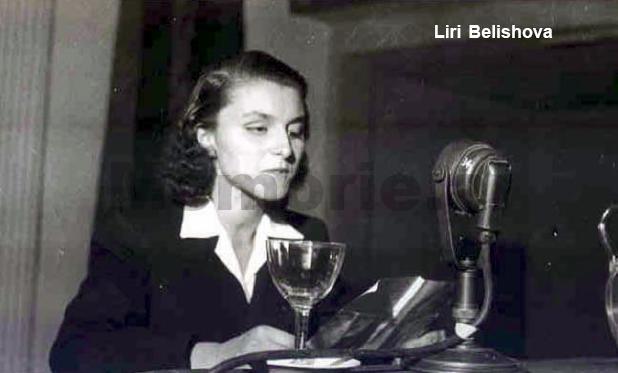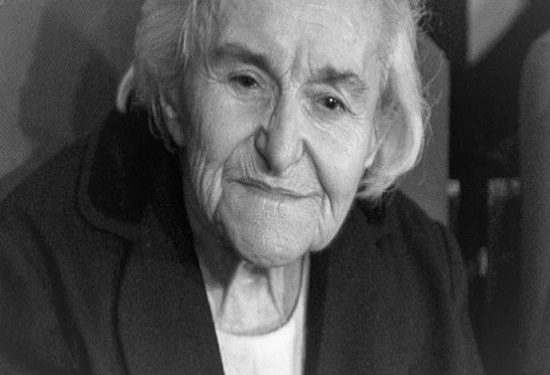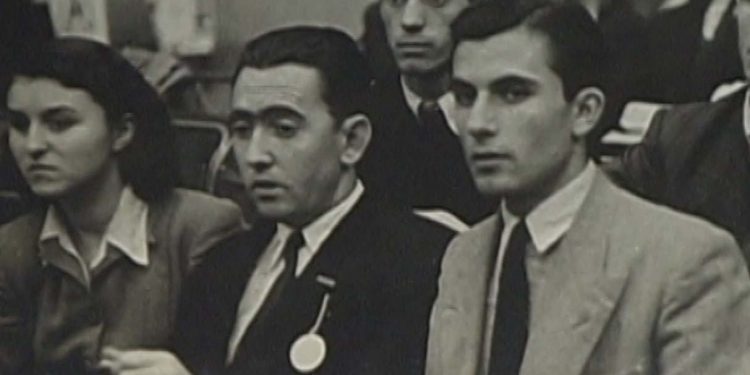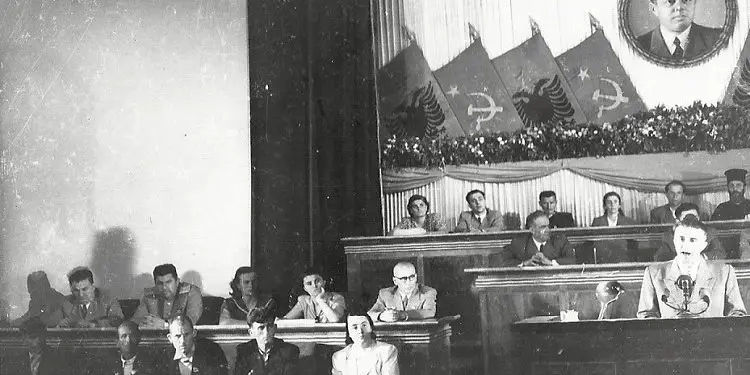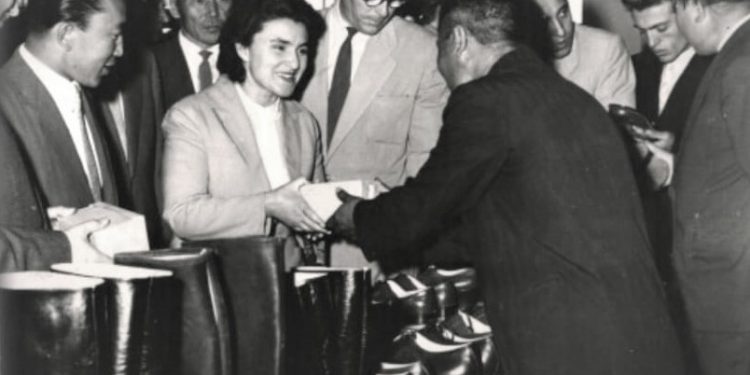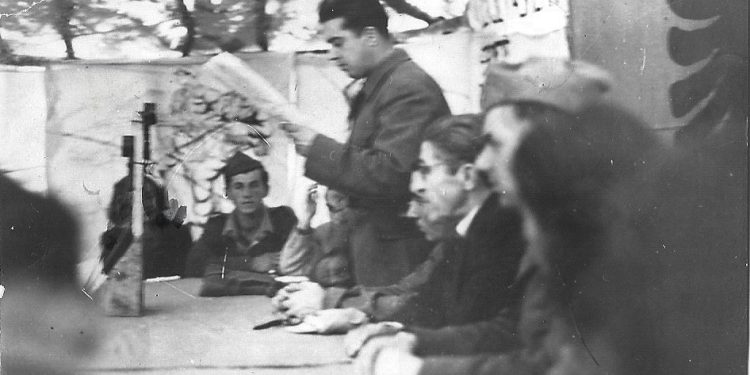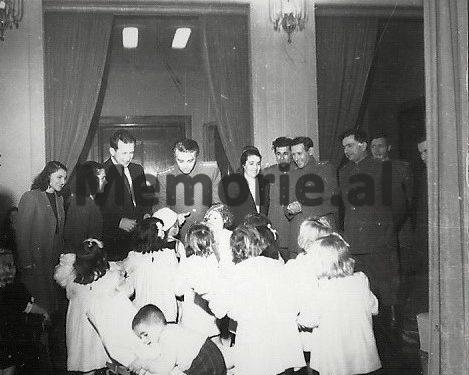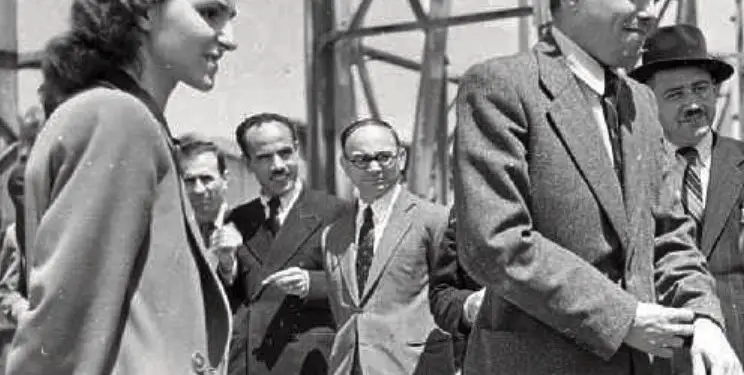The third part
Memorie.al/ Liri Belishova, former senior official of the Albanian Youth and Communist Party, since the end of the War, member of the Political Bureau and secretary of the Central Committee of the PPSh, until 1961, who was then beaten and sentenced by Enver Hoxha, ending up in prisons and exiles for three decades in a row, in one of her interviews, shortly before she passed away, she would recount many episodes related to her life, but also all the privations that followed her as a family, until the collapse of the communist regime, at the end of 1990. In this long interview, she tells many other episodes related to the death of her ex-fiancé, Nako Spiru, but also many murders, imprisonment, exile, and other persecutions that Enver Hoxha and the Albanian Communist Party undertook against their comrades and comrades, people and personalities with a lot of contribution during the War and after it.
Continues from last issue
Ms. Belishova, what about the deputies of the People’s Assembly, who tried to create an opposition group, outside the Front?
Here is another thing. Here is clearly the most negative side of Enver Hoxha, his party and the dictatorship of the proletariat, which was installed because the deputies were not only patriots and not only democrats, but above all, they were anti-fascists. You had to do with Shefqet Beja, who was the vice president of the Democratic Front; you had to do with Riza Dani, who was the Chairman of the Shkodra Front; with Gjergj Kokoshin, with Enver Sazan. These were anti-fascists; they were killed only because they were not for the communist dictatorship.
These people were not anti-communist, these people were for collaboration with the communists, but they thought that the communists would install a democratic government; they would respect some rules of the game. Because we have to take into account the fact that the Anglo-Americans made an alliance with the Soviet Union to fight what was the main danger, the fascists and the Nazis, influenced these patriots to make an alliance with the communists to fight fascism. They have been thinking that the future Albania would depend on the people’s vote and it would be a democratic Albania.
How did you manage to climb the hierarchical career ladder, becoming at the end of the 50s, one of the most powerful people in the regime?
I haven’t been, it’s a wrong opinion. I was a member of the Bureau, but you should bear in mind that not all members of the Political Bureau were powerful people. I became a member of the Bureau at the First Congress at the end of 1948, and then in 1951, I went to Moscow with another group of friends, such as Ramiz Alia, Pirro Kondi, etc., and opened the higher Party School at the Committee Central, which was like a kind of Faculty of Political Sciences and we received the diploma from the Ministry of Higher Education of the Soviet Union.
When I returned from there, my positions were in front of Enver Hoxha’s eyes, strengthened because he started talking to me differently than before. In the First Congress, where I became a member of the Bureau, I believe that Enver Hoxha wanted, in one way or another, the murder of Nako Spiro.
What about after you returned from the party school in Moscow?
So, then I became Secretary of Propaganda and Enver Hoxha started to treat me differently, he listened more attentively to my opinion. This is an interesting thing that impressed me. However, after the 20th Congress of the Party, in the meetings with this man, several times when I talked about the problems that came up and I wanted his approval, he looked at me with some regret. I don’t know how to explain this. I think that Enver Hoxha was not the one who appeared, he was not the one who said what he said, and he had other thoughts.
Did you know at that time, that you had already come into the heads of the top leaders of communism, that this caste was creating a set of privileges that were the complete opposite of the propaganda it was doing?
I found a great change when I came home from school at the end of 1954. The promise of the Politburo had changed. While I was married to Nako, Enver Hoxha, Koçi Xoxe and Nakua had privileges. Then, they started having those who were closest to Enver Hoxha: Mehmet Shehu, Tuk Jakova, Bedri Spahiu. Eliminating these, Hysni Kapo rose. The rest of us don’t. However, when I came from there, I had two guard officers besides the driver.
At home, it was the practice to have a maid and a cook. Apart from the salary we received, we did not pay rent, electricity, water, etc. Perhaps these privileges were not very big, if you were to compare them with the privileges that the leaders of the Communist Party of the Soviet Union could have, we must also take into account the proportions as countries, which were 200 or so million, with 1 million the people we were and the completely different economic development, where it was known in what condition the people lived. We had a special grocery store, a special clothing store, country houses, beach houses, etc.
Did you know the reality in Albania; did you know that the country was becoming impoverished?
To be honest, to know “Hell” you have to wear it in “Hell”. When you are in “Heaven” it is very difficult to understand what “Hell” is like. So, I want to say that I was not very aware of the real situation of the people.
But did you know that a terrible repression mechanism had begun in the country, that there were many crimes being committed?
It was what we were brought up to hate: that the class enemy and the anti-communists had to be liquidated and exterminated. But, however, every human being instinctively has a sense of humanity and a kind of democratic spirit. This thing, and a kind of culture that one creates by reading, influenced me to be impressed by many things. However, there were things that I suppressed.
All other comrades, who have had a spiritual and mental construction, more or less like me, even when we had critical thoughts about what our party, our state of the dictatorship of the proletariat was doing, we tried to suppress them, we called them as heresy.
I don’t know if you have seen the movie of a nun who has completely human thoughts and she called them heresy and then in a cell with a whip, she beat herself to death. I did not whip myself, but however I suffered, I thought that coming from a rich class, I am not quite a communist as I should be.
Now, do you feel a responsibility to have been part of that mechanism?
I definitely feel, even a very big responsibility. Not only did we not fulfill the promises we made to the people; but also our dreams, for which we sacrificed our youth and the dreams of friends who were killed by our hands, from Qemali to Margarita and many, many others. Nako Spiro was also called a martyr, because we did not realize his dreams either, but we caused a lot of damage to the people. And the most harmful part, definitely the most painful, has been the repressions.
However, no one has yet made a public apology for this…?!
I find the opportunity for myself to apologize, to apologize not only to the victims, but to all my people because, setting out to do good to the people, we caused a lot of damage. For myself, I feel proud, that I fought without sparing anything, against the occupiers, and I call this positive, when I do the trial of Liri Belishova.
I call it positive that I was able to understand, under the influence of Nako Spiro, what was happening in Albania’s relations with Yugoslavia, and in my youth I defended the interests of Albania and supported Nako Spiro, not only as my husband, but I supported precisely because he defended Albania’s interests.
And, then, I was punished not only for being the wife of Nako Spiros, but for having held positions, which were then called anti-Yugoslav. The positions were not anti-Yugoslav; they were to protect the rights of Albania.
I call myself again, with a merit since in 1960, when two paths began to crystallize in the communist movement, the one that started with the 20th Congress of the Communist Party of the Soviet Union, which was called revisionist, but which was, in fact, a reformist, liberal and peaceful path, a path that greatly eased the path of the peoples of these countries and made the transition easier.
I took a straight stand. I also justify myself with this, that the age was very young and indoctrination did not allow it, because there was also a lack of information. Do you know that I did not know that there was an Orwell in the world, apart from his works? I did not know what criticism was made of communism.
When did your first disagreements with Enver Hoxha begin?
In my interior, but not displayed. I said that I was impressed by the repressions, for example when I found out that S.Q. was shot without trial, I had great sympathy for that girl, because she was truly one of the most prominent women of Albania at that time and a wonderful woman, and Nako Spiro, who met her when he was studying at the University of Turin, spoke a lot about her.
Another thing, which has started to worry me, was Stalin’s criticism of Enver Hoxha for sectarianism, and this was Enver Hoxha of the 60s, not Enver Hoxha who continued and especially, after the 60s , that the extreme no longer knew any limits. A criticism of Stalin has been, do not rush with collectivization because, you are a small, poor, mountainous country.
I have also had a personal experience, but I am mentioning one. At the time when the directive was given to speed up collectivization, I happened to be in Shkodër, for an asset for education. However, there I found the first two generals I heard, Sadik Bekteshi and Qazim Kapisizi, two heroes of Shkodra, wearing “grand” uniforms, boy flags, which Shkodra loved very much.
And, they complained to me that they couldn’t set up a cooperative in a village in Shkodra and insisted that I go with the authority of Enver Hoxha’s colleague. Since I went to that meeting, which had only men, one per family and they were not young, I was very impressed that everyone turned pale, as if some death had happened.
We opened the meeting, talked about the importance of cooperatives, how Enveri taught us, etc. The villagers did not accept the establishment of the cooperative and did not speak, although Sadiku, Qazimi, the secretaries of the party did. I remember one, which has remained in my mind even to this day, his voice, which said: “No, I am not against the Party, I am not against Comrade Enver, but please give me just one day to I will marry my brother and then I will hand over everything to the Party”.
This is how he understood collectivization. When I returned to Tirana, thinking better how to tell Enver Hoxha in the most acceptable way, I told him this and caused a real downpour, a storm: “Liri Belishova, you have taken the position… those peasants are patriots and the party will clarify them and the cooperative will rise”!
Another thing that impressed me was that other criticism of Stalin, that you should not rush to collectivize the craftsmen, on the contrary, favor the exchange of trade, the development of small industry, etc.
As for us, we got to the point where even the polishers were collectivized; we got to the point where the peasant took milk in a glass of water in a village like Progonati, which had 80,000 sheep, where even the poorest peasant had over 100 sheep.
What was the specific cause of your breakup with Enver Hoxha?
The official clash with Enver Hoxha took place in the spring of 1960. Then it was the 90th anniversary of Lenin’s birth and it was announced as a jubilee year for all Communist Parties. Our Communist Party published a series of articles entitled “Long Live Leninism”. In fact, they were “Long Live Stalinism”.
They hit modern revisionism without a name, or Yugoslav revisionism, but it was like knocking on the window, for the door to hear. Here the 20th Congress and the current that started from it was criticized. Then the director of ATSH was Thanas Nano, Fatos Nano’s father.
He sent the news in two envelopes: special envelopes that had very secret news, one was blue and went to the Radio and all the newspapers, so they could publish; while one was green and the Reuters news was published there, that the Secretary of Propaganda, (which was me), could authorize the publication of materials, but which were usually not published.
In this green envelope, as time went by, news that came from the socialist camp, but which we were not interested in, began to be inserted, and Thanas Nano, in this case, was smart. He realized that these materials were against the official position and put them in the green envelope. So the newspapers did not publish them. However, after many days had actually passed, and I don’t know why it was so late, Enver Hoxha called me to his office one day and said: “Why haven’t the articles been published?”
And, I started to tell him: “Comrade Enver, here is actually a criticism against the 20th Congress, but in the 3rd Congress you presented the report, and there the 20th Congress is called a historical program; second, you signed the meeting of all Communist Parties that took place in 1947 in Moscow, on the occasion of the 40th anniversary of the October Revolution, and you signed that statement”, and other arguments of this type. Enver Hoxha told me: “Okay, we will not publish them”.
However, he called me again and said: “We talked with our friends”! The friends, of course, were Enveri and Hysniu, but he didn’t even ask about the others, “and they said they should be published”. Then I called to help my arsenal, Marxist-Leninist from school. At that time I was still fresh in my brain, I had just returned from Moscow and I remembered Marx, Engels and Lenin, and again Enver Hoxha told me; not to be published. However, on the third day I saw from the looks of it, there was no more room for discussion.
“We decided with our friends to publish a short summary, so that our friends won’t be disappointed,” he said. I tried in a low voice and said: “Comrade Enver, the Soviet comrades will be pleased and say that we have agreed.” “No, no, like this”, he said. “It is difficult to cut”, the second attempt, “because it is the vertebral column, it is very difficult”. “No, take a friend, -he said- and cut it.”
Then the friend I could take was my deputy, Ramiz Alia, director of Propaganda, and we sat together with Ramiz to cut them short. They were not shortened and at one point I stood up and said: “These are not shortened, I will tell my friend Enver.” Ramizi said to me: Sit down. In fact, we had been friends since the time of the War, we had gone to school together, we had worked together even when I was the secretary of propaganda, and he was related to me.
“What do you need”, he told me. “How do I need it,” I said, “but these are open. Long live Stalin.” “Did they give the order”, he told me – “they have the responsibility”. “And why did we do school?”, I said, “we did school to help our friends”, said Ramizi. I didn’t listen to him and went to Enver and after I told him, there he made the decision for me, because he saw me in such a way that it was clear what would happen to me and he said: “We Liri, not we will publish them” and the articles were not published, but they were published after I had left, the Chinese embassy published them, of course with Enver’s suggestion, in a booklet.
There is a comment according to which, at the moment you were on an official visit to China, you had a different attitude from the one that the delegation of the Labor Party of Albania had?
It’s not fair. In the beginning, the articles that are written about the Soviet-Albanian conflict of 1960, have a mistake or misunderstanding, because it is not pointed out, what I told you before, that after the death of Stalin in the XX Congress, in the communist movement, a new current began. It was this current, which was called revisionist, a little liberal, a little democratic, but it was of great importance that made life easier for these peoples.
After Stalin’s death, no one was shot, arrests were minimal, deportations were minimal, people unjustly convicted were released by train and so on in other countries. The standard of living also rose and this current was especially important, for the avoidance of the thermo-nuclear war that as Stalin had started and as Enver continued, if he had power, because he didn’t have power, the world would definitely have gone towards atomic catastrophe.
Whereas the political line followed by the Soviet Union, for a peaceful coexistence, for a relationship between the East and the West, for dialogue in the field of disarmament, etc., I say that it brought humanity a great victory, it avoided the Third World War, which it was Atomic War. There was and is war, but at least there was no world war. /Memorie.al
The next issue follows




